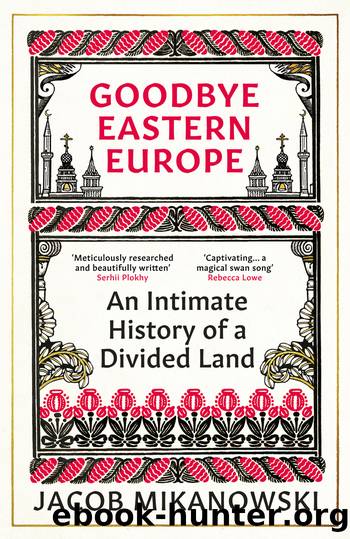Goodbye Eastern Europe by Jacob Mikanowski

Author:Jacob Mikanowski
Language: eng
Format: epub
ISBN: 9780861542604
Publisher: A Oneworld Book
Those who did not share Malevichâs faith in the revolution, and who had lived through close to a decade of bloodshed, famine, and unrest, found it hard to look upon the time before the First World War as anything but a lost paradise. To Stefan Zweig, these years were the âGolden Age of Securityâ when everything had been predictable, and every item âhad its norm, its correct measurement and weight.â25 Danilo KiÅ¡, the Yugoslavian writer, thought of them as âthose ancient, mythical times when men still wore derbies.â26 For Bruno Schulz, it had simply been the âage of genius.â
When Schulz reached back in his memory to recover the lost world of his childhood, two figures loomed larger than any others. One was the Habsburg emperor Franz Joseph I, and the other was Anna Csillag, a woman whose image seemed to appear in every newspaper in Eastern Europe before World War I. Advertisements, drawn in the coarse lines of folk woodcuts, showed her dressed in a flowery peasant frock, holding three lilies aloft in one hand. The most striking thing about her, though, was her hair: almost two meters long, it cascaded down her back like a woolly Niagara.
An accompanying text explained this remarkable growth. Translated into whatever language the newspaper was printed in, it always began the same way: âI, Anna Csillag, possess an immense, 185-centimeter growth of Lorelei-like locks thanks to fourteen months spent using my specially-formulated pomade.â Sometimes, when culturally appropriate, she compared her locks to those of a rusalka, a Slavic river-nymph, instead of the more Germanic siren. Schulz remembered Annaâs story as an almost âJob-likeâ tale, in which the young woman, cursed with a meager growth of thin and unappealing hair, lived in dread of ever finding a mate and was pitied by her entire village for her affliction.
One day, however, salvation arrived. While working with chemicals and herbs, Anna stumbled upon a truly miraculous medicine that not only cured her baldness but worked as a sort of hair-growing wonder drug. After using the mixture a few times, her hair grew in an uncontrollable torrent from her own scalp. Soon all the men in her family likewise boasted astounding pelts of lustrous black hairâfanlike beards stretching past their waists, and ropelike mustachios coiled around their trunks and midsections like so many boa constrictors. It was a blessing, one that Anna shared with the world through a stream of paid print advertisements that appeared unceasingly in the daily newspapers of Budapest, Kraków, Åódź, Vienna, Helsinki, Riga, and all points in between.
So ubiquitous were Anna Csillagâs ads that they became part of the background hum of life in the Eastern Europe of the Belle Ãpoque. Many writers besides Schulz thought of Anna when they recalled that vanished golden age. CzesÅaw MiÅosz, Gyula Krúdy, Karl Krauss, and Kálmán Mikszáth all discussed her, while Józef Wittlin, the great chronicler of prewar Lviv, devoted a whole poem to Anna, in which she becomes the symbol of every sweet and foolish thing that had vanished from the world.
Download
This site does not store any files on its server. We only index and link to content provided by other sites. Please contact the content providers to delete copyright contents if any and email us, we'll remove relevant links or contents immediately.
4 3 2 1: A Novel by Paul Auster(12393)
The handmaid's tale by Margaret Atwood(7767)
Giovanni's Room by James Baldwin(7346)
Asking the Right Questions: A Guide to Critical Thinking by M. Neil Browne & Stuart M. Keeley(5775)
Big Magic: Creative Living Beyond Fear by Elizabeth Gilbert(5774)
Ego Is the Enemy by Ryan Holiday(5450)
The Body: A Guide for Occupants by Bill Bryson(5098)
On Writing A Memoir of the Craft by Stephen King(4944)
Ken Follett - World without end by Ken Follett(4734)
Adulting by Kelly Williams Brown(4574)
Bluets by Maggie Nelson(4559)
Eat That Frog! by Brian Tracy(4541)
Guilty Pleasures by Laurell K Hamilton(4450)
The Poetry of Pablo Neruda by Pablo Neruda(4109)
Alive: The Story of the Andes Survivors by Piers Paul Read(4033)
White Noise - A Novel by Don DeLillo(4012)
Fingerprints of the Gods by Graham Hancock(4004)
The Book of Joy by Dalai Lama(3986)
The Bookshop by Penelope Fitzgerald(3854)
